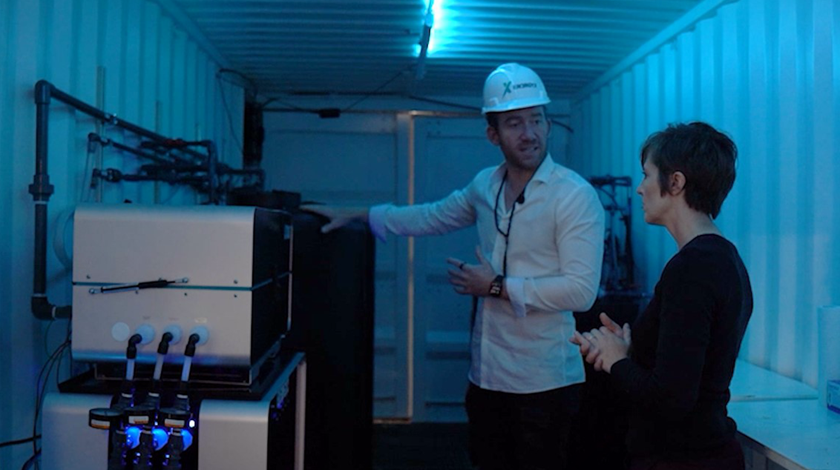Lithium Camper Battery: Revolutionizing Outdoor Adventures
Introduction:
In recent years, outdoor activities and adventures have gained immense popularity, with more and more people seeking solace and adventure in nature. As a result, the demand for advanced camping equipment and technology has increased exponentially. One such revolutionary innovation is the lithium camper battery. This article will discuss how lithium camper batteries have transformed outdoor adventures, providing campers with a reliable and efficient power source.
1. Lightweight and Compact:
One of the significant advantages of lithium camper batteries is their lightweight and compact design. Traditional lead-acid batteries used in campers are heavy, bulky, and take up valuable space. In contrast, lithium batteries are incredibly lightweight and compact, allowing campers to save space and carry more essential gear for their adventures. This feature is particularly beneficial for backpackers and hikers who need to minimize the weight of their load.
2. Long-lasting Power:
Lithium camper batteries are renowned for their exceptional performance and long-lasting power. With longer shelf life and higher energy density, these batteries can provide sustained power for extended periods without requiring frequent recharging. This feature is especially valuable for those embarking on multi-day camping trips or off-grid adventures, where access to electricity is limited.
3. Fast Charging:
Another remarkable feature of lithium camper batteries is their fast charging capability. Unlike traditional batteries that take several hours to charge fully, lithium batteries can be charged to their maximum capacity in a significantly shorter time frame. This rapid charging option allows campers to make the most of their time outdoors, ensuring they have enough power for their devices without wasting time waiting for batteries to charge.
4. Versatility:
Lithium camper batteries are designed to be versatile, meeting the diverse power needs of campers. These batteries can power a wide range of devices, including camping lights, portable fans, refrigerators, and even small appliances like coffee makers or electric stoves. This flexibility ensures that campers have access to the necessary amenities and comforts, even when they are far from civilization.
5. Increased Safety:
Unlike traditional lead-acid batteries, lithium batteries are considered safer due to their chemical composition and design. Lithium batteries are less prone to overheating or explosion, reducing the risk of accidents while camping. Additionally, they do not contain hazardous materials such as lead or acid, making them environmentally friendly. The increased safety and reduced environmental impact contribute to a more enjoyable and sustainable outdoor experience.

6. Cost-effective:
Although lithium camper batteries may have a higher initial cost compared to traditional batteries, they prove to be cost-effective in the long run. With their extended lifespan and superior performance, lithium batteries require less frequent replacements, reducing the overall cost of power supply for outdoor enthusiasts. Additionally, their energy efficiency helps campers save money on fuel or other alternative power sources, making them an economically viable option for outdoor adventures.
Conclusion:
Lithium camper batteries have undoubtedly revolutionized outdoor adventures with their lightweight design, long-lasting power, fast charging capability, versatility, increased safety, and cost-effectiveness. As more people embrace outdoor activities and seek a connection with nature, these advanced batteries provide a reliable and efficient power source, ensuring a comfortable and enjoyable camping experience. With the continuous advancement in technology, we can expect further improvements in lithium camper batteries, making them an essential component for future outdoor adventures.
-
 LiFePO4 motorcycle batteries have become increasingly popular over the years due to their various advantages over traditional lead-acid batteries. In this article, we will be discussing the advantages of using a LiFePO4 motorcycle battery. 1. Lightweight: LiFePO4 batteries are much lighter than lead-acid batteries, making them ideal for motorcycles as they contribute less weight to the overall vehicle. This...Læs mere
LiFePO4 motorcycle batteries have become increasingly popular over the years due to their various advantages over traditional lead-acid batteries. In this article, we will be discussing the advantages of using a LiFePO4 motorcycle battery. 1. Lightweight: LiFePO4 batteries are much lighter than lead-acid batteries, making them ideal for motorcycles as they contribute less weight to the overall vehicle. This...Læs mere -
 As the world becomes increasingly aware of the need to reduce our dependence on fossil fuels, many industries are exploring alternative sources of energy. One such industry is the automotive industry, which has been experimenting with lithium starter batteries as a potential replacement for traditional lead-acid batteries. These lithium batteries offer a number of advantages over their older counterparts, and...Læs mere
As the world becomes increasingly aware of the need to reduce our dependence on fossil fuels, many industries are exploring alternative sources of energy. One such industry is the automotive industry, which has been experimenting with lithium starter batteries as a potential replacement for traditional lead-acid batteries. These lithium batteries offer a number of advantages over their older counterparts, and...Læs mere -
 Lithium iron phosphate (LiFePO4) battery cells have become increasingly popular in recent years due to their high energy density, long cycle life, and safety features. These batteries are commonly used in a variety of applications, including electric vehicles, renewable energy storage, and portable electronics. LiFePO4 batteries are made up of several components, including a cathode, an anode, a separator,...Læs mere
Lithium iron phosphate (LiFePO4) battery cells have become increasingly popular in recent years due to their high energy density, long cycle life, and safety features. These batteries are commonly used in a variety of applications, including electric vehicles, renewable energy storage, and portable electronics. LiFePO4 batteries are made up of several components, including a cathode, an anode, a separator,...Læs mere -
 We rely heavily on portable electronic devices to keep us connected, informed, and entertained on the go. From smartphones to tablets, laptops to smartwatches, these innovative gadgets have become an indispensable part of our lives. Central to the success of these devices is a powerful, lightweight, and long-lasting energy source – the lithium battery. Lithium batteries have revolutionized the...Læs mere
We rely heavily on portable electronic devices to keep us connected, informed, and entertained on the go. From smartphones to tablets, laptops to smartwatches, these innovative gadgets have become an indispensable part of our lives. Central to the success of these devices is a powerful, lightweight, and long-lasting energy source – the lithium battery. Lithium batteries have revolutionized the...Læs mere -
 Starting a locomotive is a complex process that requires various components to work together seamlessly. However, one of the most critical elements in starting a locomotive is a reliable battery. Without a fully charged battery, a locomotive cannot start, and the entire operation comes to a standstill. In this article, we will discuss the importance of a reliable battery...Læs mere
Starting a locomotive is a complex process that requires various components to work together seamlessly. However, one of the most critical elements in starting a locomotive is a reliable battery. Without a fully charged battery, a locomotive cannot start, and the entire operation comes to a standstill. In this article, we will discuss the importance of a reliable battery...Læs mere -
 The development of lithium batteries has been a game-changer in the world of electronics, powering everything from our smartphones to electric cars. But where did this technology come from, and how has it evolved over time? The roots of lithium battery technology can be traced back to the 1970s, when researchers at the Exxon Corporation began experimenting with lithium...Læs mere
The development of lithium batteries has been a game-changer in the world of electronics, powering everything from our smartphones to electric cars. But where did this technology come from, and how has it evolved over time? The roots of lithium battery technology can be traced back to the 1970s, when researchers at the Exxon Corporation began experimenting with lithium...Læs mere -
 Introduction The global push towards sustainable transportation has led to a significant rise in the demand for electric vehicles (EVs). However, a major obstacle to their widespread adoption has been the limited battery capacity, resulting in shorter driving ranges and longer charging times. In recent years, the development of the lithium van battery has emerged as a game-changer in the...Læs mere
Introduction The global push towards sustainable transportation has led to a significant rise in the demand for electric vehicles (EVs). However, a major obstacle to their widespread adoption has been the limited battery capacity, resulting in shorter driving ranges and longer charging times. In recent years, the development of the lithium van battery has emerged as a game-changer in the...Læs mere

